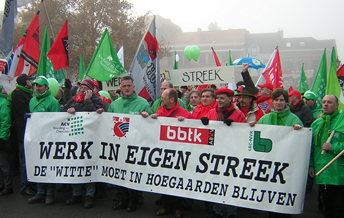Citizens join InBev workers to fight massive job cuts and closure of the historic Hoegaarden and Bellevue breweries
Posted to the IUF website 16-Dec-2005Share this article.
In the first week of December InBev Belgium announced its plan to close its Bellevue brewery in Brussels and the one in the small village of Hoegaarden, where the well-known white beer of the same name has been produced for centuries. Ironically, the news came just when Pierre Celis, who successfully relaunched the production of the famous white beer in 1965, was named honorary citizen by the local authorities of Hoegaarden. Once again InBev belies its advertising image as the "World's Local Brewer." Last year, despite large-scale popular protest it closed the UK brewery which had produced the "Cream of Manchester" (Boddington's Ale) for centuries (Background).
On 10 December, about 3000 citizens and political figures joined InBev workers in a mass demonstration against the closure. A few days later, InBev management disclosed the names of 45 redundant workers at the InBev headquarters in Leuven before an agreement on a social plan was reached. These 45 redundancies are part of a previous restructuring plan to which the closure of Hoegaarden and the more recent restructuring add a total of 232 job cuts (of which 59 in Hoegaarden).This anti-social act was contrary to all previous practice and to good faith bargaining since InBev had promised not to dismiss any worker while negotiations were ongoing. On 16 December the breweries of Belle-Vue and Hoegaarden went on strike for the day: 200 workers blocked the entrance of the InBev administrative headquarters in Leuven.

Hoegaarden and Bellevue workers on strike on 16 December
Although negotiations are continuing, relations between management and the unions are now very tense. Belgian workers received support from trade unionists in France, where InBev announced more then 300 job cuts. InBev, already the larger global brewery by volume, is trying hard to supplant Anheuser Busch as the world's most profitable brewery. Its global strategy is to restructure operations and close breweries in its established markets of Western Europe and Canada while expanding further into developing markets of Russia, China and Latin America.
InBev executives are drawn increasingly from former managers of AmBev, the large Brazilian-based brewery with which Belgian-based Interbrew merged in 2004. Its new CEO Carlos Brito comes from AmBev, which closed half of the breweries in Brazil following the merger of Brazilian brewers Brahma and Antartica. Belgian unionists learned about AmBev's brutal management methods when they visited Brazil in November 2005 to attend an IUF conference on InBev (Background).
